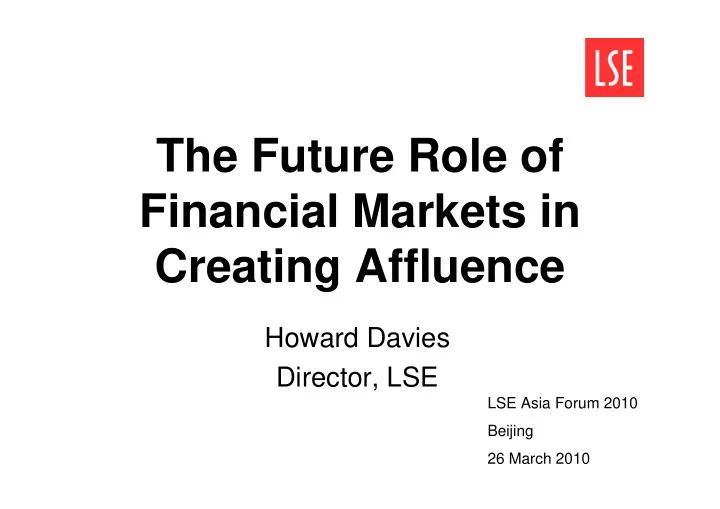

The Future Role of Financial Markets in Creating Affluence Howard Davies Director, LSE LSE Asia Forum 2010 Beijing 26 March 2010
Debt grew in most mature economies Domestic private and public sector debt¹ by country, % of GDP Source: McKinsey Global Institute, Debt and Deleveraging: The Global Bubble and its Economic Consequences (January 2010).
The historical composition of debt differs across economies Debt by country, % of GDP, 2008 Source: McKinsey Global Institute, Debt and Deleveraging: The Global Bubble and its Economic Consequences (January 2010).
The nonbank financial system has surpassed the banking system in size Size of components of US leveraged financial institutions Source: McKinsey Global Institute, Global Capital Markets: Entering a New Era (September 2009).
Asset-based securitisation expanded dramatically ABS – volumes outstanding in the US, 1996 - 2007 Source: The Turner Review. A regulatory response to the global banking crisis (March 2009).
In contrast, banks have provided the majority of the credit in the eurozone and the UK Credit outstanding, $ Trillion, using 2008 exchange rates for all years Source: McKinsey Global Institute, Global Capital Markets: Entering a New Era (September 2009).
Global financial assets fell by $16 trillion in 2008 Global financial assets, $ Trillion, using 2008 exchange rates for all years Source: McKinsey Global Institute, Global Capital Markets: Entering a New Era (September 2009).
Financial assets decreased in all regions except the UK Total financial assets per major region, $ Trillion, using 2008 exchange rates for all years Source: McKinsey Global Institute, Global Capital Markets: Entering a New Era (September 2009).
Financial sector leverage has fallen below the historic average in most countries Cross-country comparison of financial sector leverage, tangible assets/tangible common equity Source: McKinsey Global Institute, Debt and Deleveraging: The Global Bubble and its Economic Consequences (January 2010).
Cross-border capital flows have reversed, falling by 82 percent Total cross-border capital inflows, $ Trillion, using 2008 exchange rates Source: McKinsey Global Institute, Global Capital Markets: Entering a New Era (September 2009).
Household leverage measured as debt/income increased in most countries Total household debt, % of disposable income Source: McKinsey Global Institute, Debt and Deleveraging: The Global Bubble and its Economic Consequences (January 2010).
The deleveraging process has only just begun Total debt by country, % of GDP, as of Q2 2009 Source: McKinsey Global Institute, Debt and Deleveraging: The Global Bubble and its Economic Consequences (January 2010).
The fall in global capital flows in 2008 was driven by a decrease in bank lending Total cross-border capital inflows¹, $ Trillion, using 2008 exchange rates for all years Source: McKinsey Global Institute, Global Capital Markets: Entering a New Era (September 2009).
In China, the banking system remains dominant Financial assets by region, $ Trillion, %, 2008 Source: McKinsey Global Institute, Global Capital Markets: Entering a New Era (September 2009).
Financial markets in most emerging economies have significant room for growth Financial depth: Value of bank deposits, bonds, and equity as % of GDP, 2008 Source: McKinsey Global Institute, Global Capital Markets: Entering a New Era (September 2009).
Post crisis questions for China -Does the overall reform strategy need to be rethought? -What is the appropriate balance between bank and non-bank credit sources in the future? -How can financial market growth be promoted without generating new imbalances and new risks? -What lessons does the crisis offer for regulation, both content and structure?
The Future Role of Financial Markets in Creating Affluence Howard Davies Director, LSE LSE Asia Forum 2010 Beijing 26 March 2010
Recommend
More recommend